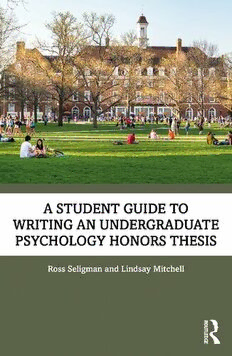
A Student Guide to Writing an Undergraduate Psychology Honors Thesis PDF
Preview A Student Guide to Writing an Undergraduate Psychology Honors Thesis
A Student Guide to Writing an Undergraduate Psychology Honors Thesis A Student Guide to Writing an Undergraduate Psychology Honors Thesis takes students through the entire process of creating a full-scale research project, from selecting a topic, to choosing an experimental or correlational design, to writing and presenting their paper. The book offers valuable guidance on developing broader skills like communicating with your supervisor, time management, and critical writing skills. Chapters cover topics such as mentor selection, collecting journal articles, gathering and analyzing data, and writing a full APA or BPS experimental paper and will orientate and guide psychology students as they navigate the expected components of an honors thesis. Designed for any student that is currently working on an independent research project, A Student Guide to Writing an Undergraduate Psychology Honors Thesis is the perfect companion for those working on their senior honors thesis in psychology. R oss Seligman is currently an assistant adjunct professor at Pasadena City College. He has been teaching at various colleges for the past 30 years. His speciality is teaching Research Methods in Psychology and mentoring students on their independent research projects. During his academic career he has also been a tenured professor, worked as a department chair for eight years, and served as a dean for one year. L indsay Mitchell is currently a master’s student attending Parker University. She is studying neuroscience and hopes to contribute to research in neural prosthesis and related topics. During her young adult life, Lindsay worked as a direct support professional for an individual with autism who inspired her future research interests. She aims to extend the use of neural prosthetics to similar individuals in the effort to enhance their day-to-day lives. A Student Guide to Writing an Undergraduate Psychology Honors Thesis Ross Seligman and Lindsay Mitchell First published 2023 by Routledge 605 Third Avenue, New York, NY 10158 and by Routledge 4 Park Square, Milton Park, Abingdon, Oxon, OX14 4RN Routledge is an imprint of the Taylor & Francis Group, an informa business © 2023 Ross Seligman and Lindsay Mitchell The right of Ross Seligman and Lindsay Mitchell to be identified as authors of this work has been asserted in accordance with sections 77 and 78 of the Copyright, Designs and Patents Act 1988. All rights reserved. No part of this book may be reprinted or reproduced or utilised in any form or by any electronic, mechanical, or other means, now known or hereafter invented, including photocopying and recording, or in any information storage or retrieval system, without permission in writing from the publishers. Trademark notice: Product or corporate names may be trademarks or registered trademarks, and are used only for identification and explanation without intent to infringe. Library of Congress Cataloging-in-Publication Data A catalog record for this title has been requested ISBN: 978-0-367-56809-2 (hbk) ISBN: 978-0-367-56252-6 (pbk) ISBN: 978-1-003-09940-6 (ebk) DOI: 10.4324/9781003099406 Typeset in Bembo by Apex CoVantage, LLC Contents PART I Getting Started 1 1 Getting Started 3 2 Choosing and Working With Your Mentor 7 3 Difficult Concepts Made Easier 10 PART II Designing Your Experiment and Writing Your Proposal 21 4 Picking a Topic and Designing Your Experiment 23 5 Submitting a Proposal for IRB Approval 29 6 Understanding Journal Articles 33 7 Writing a Literature Review 38 8 Writing a Methods Section 43 PART III Conducting Your Study, Analyzing Your Data, and Finishing Your Paper 49 9 Conducting Your Experiment 51 10 Analyzing Your Data and Writing a Results Section 54 11 Writing a Discussion Section 66 vi Contents 12 Final Touches: Title Page, Abstract, and Checklists 70 13 Presenting Your Findings 76 14 Conclusion: What Might Be in Your Future? 82 Index 85 Part I Getting Started 1 Getting Started Greetings! Your ambition has led you to pursue an undergraduate honors thesis in psychology. This puts you at the top of your game. The project that you will be completing in the next year will be a large project during which you will learn several new skills and be able to work alongside other talented researchers at your school. With that in mind, let’s get started! Introductions I would like to start off with a couple of introductions. My name is Ross Selig- man and I have been teaching psychology at various colleges for the past 30 years. I specialize in teaching research methods and mentoring students as they carry out their research projects. I also completed a senior honors thesis when I was an DOI: 10.4324/9781003099406-2
